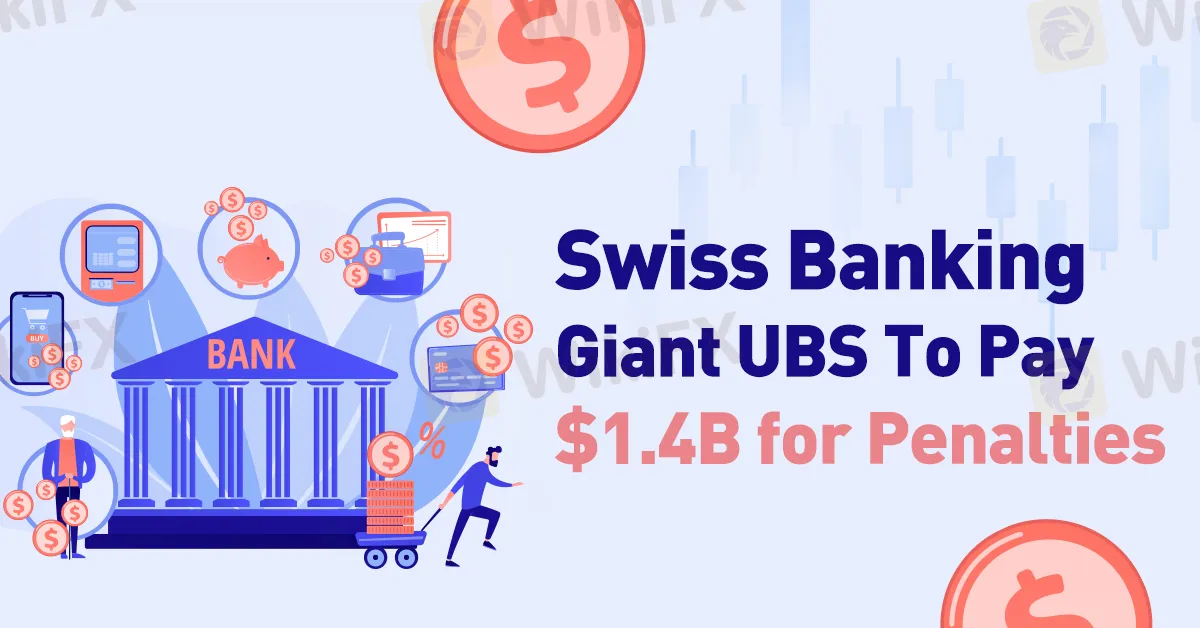简体中文
繁體中文
English
Pусский
日本語
ภาษาไทย
Tiếng Việt
Bahasa Indonesia
Español
हिन्दी
Filippiiniläinen
Français
Deutsch
Português
Türkçe
한국어
العربية
Swiss Banking Giant UBS To Pay $1.4B for Penalties
Abstract:UBS agrees to pay $1.44 billion in fines for alleged fraud in sale of mortgage-backed securities.

UBS, the prominent Swiss banking behemoth, has concurred to disburse a staggering $1.44 billion in fines to resolve allegations of fraud. The accusations pertain to the bank's purported misleading of investors in the United States through selling residential mortgage-backed securities (RMBS) in the lead-up to the tumultuous 2008 financial crisis. This significant development was officially communicated today (Monday) by the United States Department of Justice (DOJ).
Emerging from a legal entanglement initiated several years ago, the law enforcement agency had lodged claims that UBS engaged in fraudulent activities by providing false and deceptive information concerning 40 RMBS issued in 2006 and 2007. The crux of the allegations revolved around UBS's purported knowledge, as they had purportedly carried out exhaustive due diligence on the underlying loans before the issuance of the RMBS. This diligence was ostensibly conducted to ascertain the alignment of the loans with the representations intended for investors. Regrettably, the outcome saw the aforementioned 40 RMBS incurring substantial financial losses.

Furthermore, the agency emphasized that this settlement culminates the final case pursued by its dedicated task forces, which were established to scrutinize the actions of financial institutions and other pertinent actors during the financial crisis.
It is worth noting that before this resolution, the DOJ had secured agreements to settle akin allegations of fraud against other significant financial entities such as Nomura Holdings, the Royal Bank of Scotland (RBS), Merrill Lynch, and Barclays. Consequently, in conjunction with the fresh accord reached with UBS, the collective tally of penalties imposed on banks, loan originators, and rating agencies ensnared within the ambit of the DOJ's investigation has now surpassed a formidable $36 billion, as iterated by the justice department.
Nevertheless, the agency underscored that the allegations resolved through the settlement with UBS remain just allegations. This stipulation implies that UBS has not admitted to any wrongdoing. In tandem, UBS validated the settlement in an issued statement, revealing that the financial provision for this settlement had been accounted for in the preceding periods.
“The substantial civil penalty, in this case, serves as a warning to other players in the financial markets who seek to unlawfully profit through fraud that we will hold them accountable no matter how long it takes,” declared Breon Peace, the US Attorney for the Eastern District of New York, accentuating the significance of the agreement.
He underscored the DOJ's unwavering dedication to safeguarding financial markets, investors, and the general public against deceitful practices. The amassed sum of over $36 billion, designated for behaviours that exacerbated the 2008 financial crisis, is a poignant testament to the Department of Justice's steadfast commitment, added Peace.

Disclaimer:
The views in this article only represent the author's personal views, and do not constitute investment advice on this platform. This platform does not guarantee the accuracy, completeness and timeliness of the information in the article, and will not be liable for any loss caused by the use of or reliance on the information in the article.
Read more

Exposed: Deceptive World of Fake Trading Gurus – Don’t Get Fooled!
The internet is inundated with advertisements and promotions from self-proclaimed trading gurus who promise to teach you how to become a successful trader and earn a substantial secondary income. These individuals often claim that their trading techniques can make you rich, even if you have zero experience. However, these assertions are typically false, and many people fall victim to these scams. This article aims to expose these fake trading gurus, explain how they operate, and provide tips on how to avoid being scammed.

Navigating the Intersection of Forex Markets, AI Technology, and Fintech
The financial world is transforming, driven by the rapid integration of artificial intelligence (AI) and innovative fintech solutions. This change is most apparent in forex markets, where algorithmic trading and deep learning are redefining strategies, risk management, and decision-making. In this article, we explore how AI-driven technologies are not only revolutionizing forex trading but are also propelling fintech innovations that enhance customer experiences, bolster security, and unlock new market opportunities.

The One Fear That’s Costing You More Than Just Profits
The fear of missing out (FOMO) is NOT what you think it is! Read the three lesser-discussed components that contribute greatly to FOMO trading!

Bitpanda Secures Full Broker-Dealer License in Dubai
Bitpanda has officially obtained a full broker-dealer license from the Dubai Virtual Assets Regulatory Authority (VARA), marking a significant milestone in its international expansion. This approval, which follows preliminary authorization granted three months earlier, enables the European digital asset exchange to introduce its comprehensive suite of virtual asset services to investors in the United Arab Emirates (UAE).
WikiFX Broker
Latest News
Interactive Brokers Expands Crypto Trading with Solana, XRP, Cardano, and Dogecoin
Fidelity Investments Explores Stablecoin Innovation in Digital Assets Sector
Why More People Are Trading Online Today?
SEC Ends Crypto.com Probe, No Action Taken by Regulator
How Crypto Trading Transforms FX and CFD Brokerage Industry
UK would not hesitate to retaliate against US tariffs - No 10 sources
Gold Surges to New Highs – Is It Time to Buy?
Bitpanda Secures Full Broker-Dealer License in Dubai
Lost Money to Scam Recently?! This Article Could Help You!
Navigating the Intersection of Forex Markets, AI Technology, and Fintech
Currency Calculator







